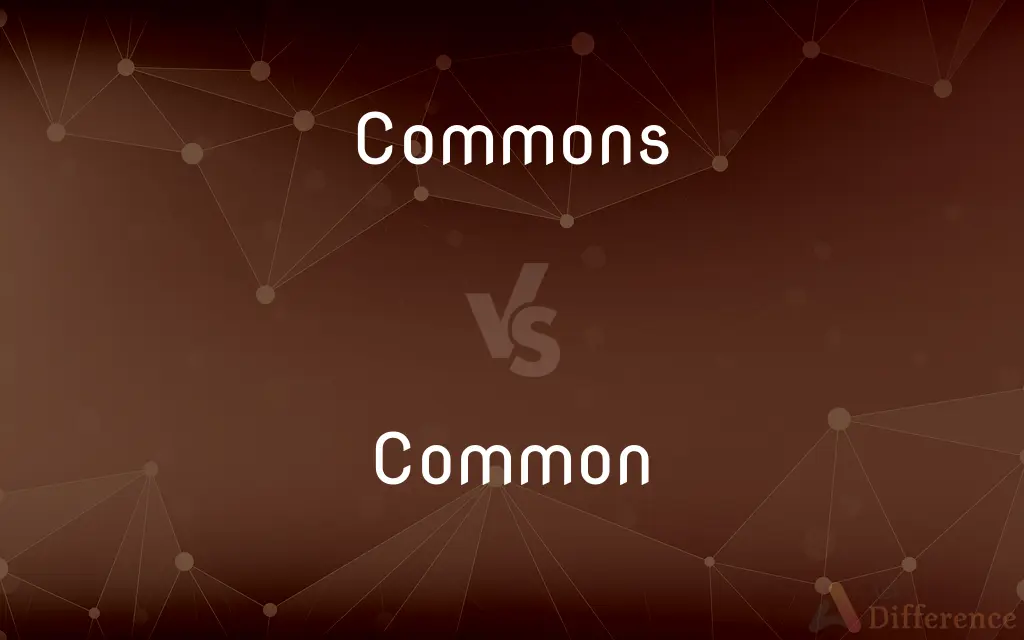Commons vs. Common — What's the Difference?
By Tayyaba Rehman & Fiza Rafique — Updated on April 28, 2024
"Commons" refers to resources shared by a community with joint rights of access, like public parks or air, while "common" describes something usual, ordinary, or shared by many.

Difference Between Commons and Common
Table of Contents
ADVERTISEMENT
Key Differences
The term "commons" is used to denote resources accessible to all members of a community, such as water bodies, grazing lands, or public spaces, emphasizing the collective ownership or usage rights. In contrast, "common" is an adjective that describes something that is frequent, typical, or widely shared, often used to denote prevalence or shared attributes among different entities.
"Commons" often involves a communal aspect, where the focus is on the management and sustainable use of shared resources. This contrasts with "common," which can refer to general characteristics or occurrences, such as common knowledge or common practices, without implying shared ownership or management responsibilities.
In historical contexts, "commons" refers specifically to land or resources that were traditionally shared among the inhabitants of a region, governed by local customs or laws. On the other hand, "common" can describe anything from everyday occurrences to widely held beliefs, without the specific context of shared resources.
"Commons" carries a sense of communal responsibility and collective benefit, suggesting that these resources require cooperative management to prevent overuse or depletion. Meanwhile, "common" merely indicates ordinariness or ubiquity, such as a common mistake or common courtesy, which do not involve collective management.
The governance of "commons" is a significant aspect, involving rules and norms developed by the community to ensure fair use and sustainability. Conversely, "common" does not inherently involve governance or management but simply denotes typicality or widespread occurrence.
ADVERTISEMENT
Comparison Chart
Definition
Shared resources with communal access.
Ordinary, typical, or widely shared.
Usage Context
Environmental, historical communal resources.
General descriptions of prevalence or norms.
Implication
Communal management and sustainability.
Ubiquity and typicality.
Examples
Community parks, public libraries.
Common sense, common interests.
Governance
Often involves specific rules or laws.
No specific governance implied.
Compare with Definitions
Commons
Resources shared by a community.
The local commons includes the town square and community garden.
Common
General or usual.
In many cultures, it is common courtesy to remove your shoes before entering a home.
Commons
Traditionally, land available for communal use.
The village commons was a place where anyone could graze their livestock.
Common
Widely found or occurring.
It is common to see birds in these trees.
Commons
Subject to communal rights.
The fishing commons are accessed based on community-established rules.
Common
Ordinary, not special.
The restaurant's decor was quite common, nothing extraordinary.
Commons
Managed for sustainable use.
The water commons is carefully monitored to maintain a healthy ecosystem.
Common
Shared by many; not rare.
A common interest among the group is environmental conservation.
Commons
Areas or materials managed collectively.
The grazing commons are managed to prevent overuse.
Common
Typical or expected.
It is common for him to arrive early.
Commons
The commons is the cultural and natural resources accessible to all members of a society, including natural materials such as air, water, and a habitable earth. These resources are held in common, not owned privately.
Common
Belonging equally to or shared equally by two or more; joint
Common interests.
Commons
Belonging equally to or shared equally by two or more; joint
Common interests.
Common
Of or relating to the community as a whole; public
For the common good.
Commons
Of or relating to the community as a whole; public
For the common good.
Common
Widespread; prevalent
Gas stations became common as the use of cars grew.
Commons
Widespread; prevalent
Gas stations became common as the use of cars grew.
Common
Occurring frequently or habitually; usual
It is common for movies to last 90 minutes or more.
Commons
Occurring frequently or habitually; usual
It is common for movies to last 90 minutes or more.
Common
Most widely known; ordinary
The common housefly.
Commons
Most widely known; ordinary
The common housefly.
Common
Having no special designation, status, or rank
A common sailor.
Commons
Having no special designation, status, or rank
A common sailor.
Common
Not distinguished by superior or noteworthy characteristics; average
The common spectator.
Commons
Not distinguished by superior or noteworthy characteristics; average
The common spectator.
Common
Of no special quality; standard
Common procedure.
Commons
Of no special quality; standard
Common procedure.
Common
Of mediocre or inferior quality; second-rate
Common cloth.
Commons
Of mediocre or inferior quality; second-rate
Common cloth.
Common
Unrefined or coarse in manner; vulgar
Behavior that branded him as common.
Commons
Unrefined or coarse in manner; vulgar
Behavior that branded him as common.
Common
Either masculine or feminine in gender.
Commons
Either masculine or feminine in gender.
Common
Representing one or all of the members of a class; not designating a unique entity.
Commons
Representing one or all of the members of a class; not designating a unique entity.
Common
Commons The common people; commonalty.
Commons
Commons The common people; commonalty.
Common
The social class composed of commoners.
Commons
The social class composed of commoners.
Common
The parliamentary representatives of this class.
Commons
The parliamentary representatives of this class.
Common
Commons The House of Commons.
Commons
Commons The House of Commons.
Common
A tract of land, usually in a centrally located spot, belonging to or used by a community as a whole
A band concert on the village common.
Commons
A tract of land, usually in a centrally located spot, belonging to or used by a community as a whole
A band concert on the village common.
Common
The legal right of a person to use the lands or waters of another, as for fishing.
Commons
The legal right of a person to use the lands or waters of another, as for fishing.
Common
Commons(used with a sing. verb) A building or hall for dining, typically at a university or college.
Commons
Commons(used with a sing. verb) A building or hall for dining, typically at a university or college.
Common
Common stock.
Commons
Common stock.
Common
(Ecclesiastical) A service used for a particular class of festivals.
Commons
(Ecclesiastical) A service used for a particular class of festivals.
Common
Mutual; shared by more than one.
The two competitors have the common aim of winning the championship.
Winning the championship is an aim common to the two competitors.
Commons
Plural of common
Common
Occurring or happening regularly or frequently; usual.
It is common to find sharks off this coast.
Commons
A dining hall, usually at a college or university.
Common
Found in large numbers or in a large quantity; usual.
Commoner used to be commoner, but more common is now more common.
Sharks are common in these waters.
It differs from the common blackbird in the size of its beak.
Commons
A central section of (usually an older) town, designated as a shared area, a common.
The Renaissance festival started with the "peasants" meeting in the commons.
The commons is the green space surrounded by the village hall, the school, and the church.
The commons of New England towns are important contributors to their charm.
Common
Simple, ordinary or vulgar.
Commons
(figuratively) The mutual good of all; the abstract concept of resources shared by more than one, for example air, water, information.
Res communis
"The tragedy of the commons" is that none wish to make sacrifices of their or their family's interests for the common good.
Common
(grammar) Of, pertaining or belonging to the common gender.
Commons
The common people collectively, the third estate, the people not belonging to the nobility or clergy
Common
(grammar) Of or pertaining to common nouns as opposed to proper nouns.
Commons
The free burghers/bourgeoisie of a given town, taken collectively.
Common
Vernacular, referring to the name of a kind of plant or animal, i.e., common name vs. scientific name.
Commons
An outhouse.
Common
(obsolete) Profane; polluted.
Commons
Food served at a fixed rate from the college buttery, distinguished from battels.
Common
(obsolete) Given to lewd habits; prostitute.
Commons
Food in general; rations.
Short commons
Common
Mutual good, shared by more than one.
Commons
The mass of the people, as distinguished from the titled classes or nobility; the commonalty; the common people.
'T is like the commons, rude unpolished hinds,Could send such message to their sovereign.
The word commons in its present ordinary signification comprises all the people who are under the rank of peers.
Common
A tract of land in common ownership; common land.
Commons
The House of Commons, or lower house of the British Parliament, consisting of representatives elected by the qualified voters of counties, boroughs, and universities.
It is agreed that the Commons were no part of the great council till some ages after the Conquest.
Common
The people; the community.
Commons
Provisions; food; fare, - as that provided at a common table in colleges and universities.
Their commons, though but coarse, were nothing scant.
Common
(legal) The right of taking a profit in the land of another, in common either with the owner or with other persons; so called from the community of interest which arises between the claimant of the right and the owner of the soil, or between the claimants and other commoners entitled to the same right.
Commons
A club or association for boarding at a common table, as in a college, the members sharing the expenses equally; as, to board in commons.
Common
(obsolete) To communicate (something).
Commons
A common; public pasture ground.
To shake his ears, and graze in commons.
Common
(obsolete) To converse, talk.
Commons
A piece of open land for recreational use in an urban area;
They went for a walk in the park
Common
(obsolete) To participate.
Commons
A pasture subject to common use
Common
(obsolete) To have a joint right with others in common ground.
Commons
Class composed of persons lacking noble or knightly or gentle rank
Common
(obsolete) To board together; to eat at a table in common.
Common
Belonging or relating equally, or similarly, to more than one; as, you and I have a common interest in the property.
Though life and sense be common to men and brutes.
Common
Belonging to or shared by, affecting or serving, all the members of a class, considered together; general; public; as, properties common to all plants; the common schools; the Book of Common Prayer.
Such actions as the common good requireth.
The common enemy of man.
Common
Often met with; usual; frequent; customary.
Grief more than common grief.
Common
Not distinguished or exceptional; inconspicuous; ordinary; plebeian; - often in a depreciatory sense.
The honest, heart-felt enjoyment of common life.
This fact was infamousAnd ill beseeming any common man,Much more a knight, a captain and a leader.
Above the vulgar flight of common souls.
Common
Profane; polluted.
What God hath cleansed, that call not thou common.
Common
Given to habits of lewdness; prostitute.
A dame who herself was common.
Common
The people; the community.
Common
An inclosed or uninclosed tract of ground for pleasure, for pasturage, etc., the use of which belongs to the public; or to a number of persons.
Common
The right of taking a profit in the land of another, in common either with the owner or with other persons; - so called from the community of interest which arises between the claimant of the right and the owner of the soil, or between the claimants and other commoners entitled to the same right.
Common
To converse together; to discourse; to confer.
Embassadors were sent upon both parts, and divers means of entreaty were commoned of.
Common
To participate.
Common
To have a joint right with others in common ground.
Common
To board together; to eat at a table in common.
Common
A piece of open land for recreational use in an urban area;
They went for a walk in the park
Common
Belonging to or participated in by a community as a whole; public;
For the common good
Common lands are set aside for use by all members of a community
Common
Of no special distinction or quality; widely known or commonly encountered; average or ordinary or usual;
The common man
A common sailor
The common cold
A common nuisance
Followed common procedure
It is common knowledge that she lives alone
The common housefly
A common brand of soap
Common
Common to or shared by two or more parties;
A common friend
The mutual interests of management and labor
Common
Commonly encountered;
A common (or familiar) complaint
The usual greeting
Common
Being or characteristic of or appropriate to everyday language;
Common parlance
A vernacular term
Vernacular speakers
The vulgar tongue of the masses
The technical and vulgar names for an animal species
Common
Of or associated with the great masses of people;
The common people in those days suffered greatly
Behavior that branded him as common
His square plebeian nose
A vulgar and objectionable person
The unwashed masses
Common
Of low or inferior quality or value;
Of what coarse metal ye are molded
Produced...the common cloths used by the poorer population
Common
Lacking refinement or cultivation or taste;
He had coarse manners but a first-rate mind
Behavior that branded him as common
An untutored and uncouth human being
An uncouth soldier--a real tough guy
Appealing to the vulgar taste for violence
The vulgar display of the newly rich
Common
To be expected; standard;
Common decency
Common Curiosities
What is a common mistake people make regarding commons?
A common mistake is treating commons as unlimited resources, leading to overuse and depletion, often referred to as the "tragedy of the commons."
How do communities manage commons?
Communities manage commons through agreed-upon rules or norms designed to ensure fair use and sustainability of the resources.
Can something be common but not part of the commons?
Yes, something can be common, like a type of behavior or occurrence, without being part of the commons, which specifically refers to shared resources.
What is the legal definition of commons?
Legally, "commons" refers to land or resources that are collectively owned or managed by a community under specific regulations or traditions.
Can "common" refer to shared values?
Yes, "common" can refer to values or beliefs shared by a group, such as common goals or common ground in discussions.
Can "common" be used in a positive sense?
Yes, "common" can have a positive connotation when referring to shared experiences or mutual understanding that enhances social cohesion.
What distinguishes a common law from other laws?
Common law is a body of unwritten laws based on legal precedents established by the courts, unlike statutory laws which are enacted by legislative bodies.
Is "common" always associated with something ordinary?
Typically, yes, "common" denotes something ordinary or typical, but it can also imply a shared attribute or occurrence among a group.
What are examples of digital commons?
Examples of digital commons include open-source software and public domain databases that users can freely access and contribute to.
How does the concept of commons relate to modern environmental issues?
The concept of commons is central to discussions on sustainable resource management, especially in addressing issues like overfishing, deforestation, and water scarcity.
What happens when commons are mismanaged?
Mismanagement of commons can lead to resource depletion, environmental degradation, and loss of access for the community.
How do individuals contribute to the preservation of commons?
Individuals contribute by adhering to community guidelines, participating in maintenance efforts, and promoting sustainable practices.
Why is governance important in the context of commons?
Governance ensures that commons are used responsibly and sustainably, preventing exploitation and ensuring their availability for future generations.
What role do commons play in urban environments?
In urban environments, commons like parks and public spaces provide essential communal areas that enhance quality of life and foster community interaction.
How does common knowledge differ from specialized knowledge?
Common knowledge is known by many people and does not require specialized training or education, unlike specialized knowledge which is typically domain-specific.
Share Your Discovery

Previous Comparison
Transfection vs. Transduction
Next Comparison
Bail vs. ParoleAuthor Spotlight
Written by
Tayyaba RehmanTayyaba Rehman is a distinguished writer, currently serving as a primary contributor to askdifference.com. As a researcher in semantics and etymology, Tayyaba's passion for the complexity of languages and their distinctions has found a perfect home on the platform. Tayyaba delves into the intricacies of language, distinguishing between commonly confused words and phrases, thereby providing clarity for readers worldwide.
Co-written by
Fiza RafiqueFiza Rafique is a skilled content writer at AskDifference.com, where she meticulously refines and enhances written pieces. Drawing from her vast editorial expertise, Fiza ensures clarity, accuracy, and precision in every article. Passionate about language, she continually seeks to elevate the quality of content for readers worldwide.
















































